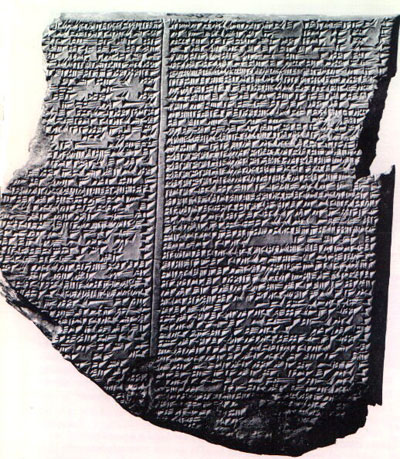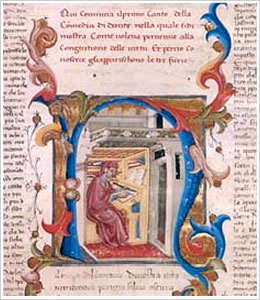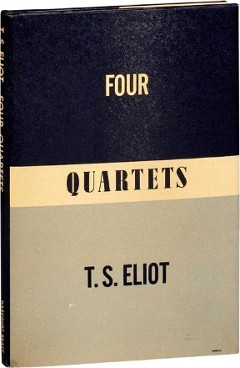As suggested by poets.org, in conjunction with National Poetry Month, today is Poem in Your Pocket Day! The idea is simple: fold up a copy of your favorite poem, stuff it in your pocket, and then share it with people today.
Though we live in a click and print age, and while this totally awesome day promotes the spread of poetry, it is interesting to think how we come to this point. The history of western poetry stretches back to the earliest of humanity's stories. The oldest extant piece of poetry that we have is the ancient Epic of Gilgamesh. Though it was written in the early third millennium BCE, some scholars believe that the actual narrative was composed as early as the seventh millennium BCE. Why such great disparity? Because poetry predates literacy. The earliest poems were meant to be chanted or sung, and in some cases accompanied by music. Even Homer's well-known epic The Odyssey is believed to most likely have been sung by a rhapsode; at any rate, it certainly wasn't printed (and certainly wouldn't have been pocket size if it had been).
The epic tradition passed from the ancients like Homer and Hesiod, Virgil and Valmiki, down to the medieval stories of Beowulf and Chanson De Roland, and one to the likes of Aligherri, Milton and Eliot.
The Epic of Gilgamesh was written first in cuneiform with a stylus on twelve clay tablets around 2300 BCE, and then later on papyrus with ink. It wasn't recovered until 1853 CE when Assyrian Assyriologist Hormuzd Rassam discovered it. By the 1870s it had received its first publication in English and its popularity grew exponentially.
Though written by Dane Alligheri around 1303, we no longer have any of his copies of the manuscript for the Divine Comedy. Its salvation is due to Boccacio's copying of the early manuscripts about a decade after Dante's death.
The Quartets were considered by Eliot to be his masterpiece. Written amid several forrays to lecture in England during the Blitz, Eliot had envisioned it initially as a sort of companion to The Wasteland. Dante himself appears to have some presence in the text, as many critics have pointed out that the actions seems to take place in his vision of Paradisio.
These are all well and good, but they don't exactly make the form accessible. Poetry since the advent of the modern era has become more and more compact, more concerned with the way that the text interacts with the page. In contrast to its origins, today's poetry loses a bit of something if it is spoken rather than read. And so, here we offer some brief pocket-sized poems for your reading pleasure. Stop by Fogelson Library today for some more!
Eating Poetry
Ink runs from the corners of my mouth.
There is no happiness like mine.
I have been eating poetry.
The librarian does not believe what she sees.
Her eyes are sad
and she walks with her hands in her dress.
The poems are gone.
The light is dim.
The dogs are on the basement stairs and coming up.
Their eyeballs roll,
their blond legs bum like brush.
The poor librarian begins to stamp her feet and weep.
She does not understand.
When I get on my knees and lick her hand,
she screams.
I am a new man.
I snarl at her and bark.
I romp with joy in the bookish dark.
-Mark Strand
Poetry (1967 Revision)
I, too, dislike it.
***Reading it, however, with a perfect contempt for it, one discovers in
***it, after all, a place for the genuine.
-Marianne Moore
... and a one line poem by Samuel Beckett (for the already poem-stuffed pocket):
away dream all away
 |
| Thanks to the unquiet librarian for the pic! |
Though we live in a click and print age, and while this totally awesome day promotes the spread of poetry, it is interesting to think how we come to this point. The history of western poetry stretches back to the earliest of humanity's stories. The oldest extant piece of poetry that we have is the ancient Epic of Gilgamesh. Though it was written in the early third millennium BCE, some scholars believe that the actual narrative was composed as early as the seventh millennium BCE. Why such great disparity? Because poetry predates literacy. The earliest poems were meant to be chanted or sung, and in some cases accompanied by music. Even Homer's well-known epic The Odyssey is believed to most likely have been sung by a rhapsode; at any rate, it certainly wasn't printed (and certainly wouldn't have been pocket size if it had been).
The epic tradition passed from the ancients like Homer and Hesiod, Virgil and Valmiki, down to the medieval stories of Beowulf and Chanson De Roland, and one to the likes of Aligherri, Milton and Eliot.
 | |
| From here... |
The Epic of Gilgamesh was written first in cuneiform with a stylus on twelve clay tablets around 2300 BCE, and then later on papyrus with ink. It wasn't recovered until 1853 CE when Assyrian Assyriologist Hormuzd Rassam discovered it. By the 1870s it had received its first publication in English and its popularity grew exponentially.
Though written by Dane Alligheri around 1303, we no longer have any of his copies of the manuscript for the Divine Comedy. Its salvation is due to Boccacio's copying of the early manuscripts about a decade after Dante's death.
 |
| to here... |
 | |
| ... to now. |
These are all well and good, but they don't exactly make the form accessible. Poetry since the advent of the modern era has become more and more compact, more concerned with the way that the text interacts with the page. In contrast to its origins, today's poetry loses a bit of something if it is spoken rather than read. And so, here we offer some brief pocket-sized poems for your reading pleasure. Stop by Fogelson Library today for some more!
Eating Poetry
Ink runs from the corners of my mouth.
There is no happiness like mine.
I have been eating poetry.
The librarian does not believe what she sees.
Her eyes are sad
and she walks with her hands in her dress.
The poems are gone.
The light is dim.
The dogs are on the basement stairs and coming up.
Their eyeballs roll,
their blond legs bum like brush.
The poor librarian begins to stamp her feet and weep.
She does not understand.
When I get on my knees and lick her hand,
she screams.
I am a new man.
I snarl at her and bark.
I romp with joy in the bookish dark.
-Mark Strand
Poetry (1967 Revision)
I, too, dislike it.
***Reading it, however, with a perfect contempt for it, one discovers in
***it, after all, a place for the genuine.
-Marianne Moore
... and a one line poem by Samuel Beckett (for the already poem-stuffed pocket):
away dream all away